Defining Homeowners Association Fees
Homeowners Association Fees are monthly payments, made by a homeowner to their neighborhood Homeowner's Association (HOA).
The fee is imposed by a Homeowners Association (HOA) which is an organization formed by a community of homeowners.
HOA fees are common for those who own or rent condominiums, but may also be levied on single-family homes as well.
Typically these fees are applied at a set rate that is known at the point of purchase of the respective home.
HOA fees are an integral part of community living, primarily in condominiums, townhomes, and planned single-family home neighborhoods.
What Is the Purpose of HOA Fees?
HOA fees are collected and then put to use for the purpose of maintaining or expanding shared common areas within the neighborhood or complex.
For example, in most condo complexes there is typically a lobby of some kind, maybe a pool, a couple of sports courts and a gym.
All of which need to be maintained up to a certain level. HOA fees ensure that this takes place.
Community Maintenance and Upkeep
This includes landscaping and lawn care, trash removal, snow removal, and maintenance of communal facilities like swimming pools, clubhouses, fitness centers, playgrounds, and parks.
The overarching goal is to ensure that the community remains visually appealing, clean, and safe for all residents.
HOA fees also cover costs associated with maintenance of structural elements in shared buildings such as elevators, hallways, parking garages, roofs, and exterior walls.
The maintenance tasks can range from routine checks to substantial repairs, ensuring that the living conditions meet acceptable standards.
Funding Community Amenities and Services
This encompasses a wide range of features like swimming pools, tennis courts, gyms, clubhouses, golf courses, and other recreational facilities.
Fees may also go towards providing services such as security patrols, concierge services, and social activities for residents.
Besides, HOA fees may also cover certain utilities such as water, sewer, and in some cases, cable or internet services.
The amenities and services offered can vary widely from one community to another, largely depending on the preferences of the residents and the size of the HOA fees.
Future Repairs and Improvements
This could involve projects like replacing a roof on a condo building, resurfacing a community pool, upgrading a fitness center, or repaving roads.
Establishing a reserve fund is crucial as it prevents the need for residents to face unexpected large assessments when big-ticket items eventually need attention.
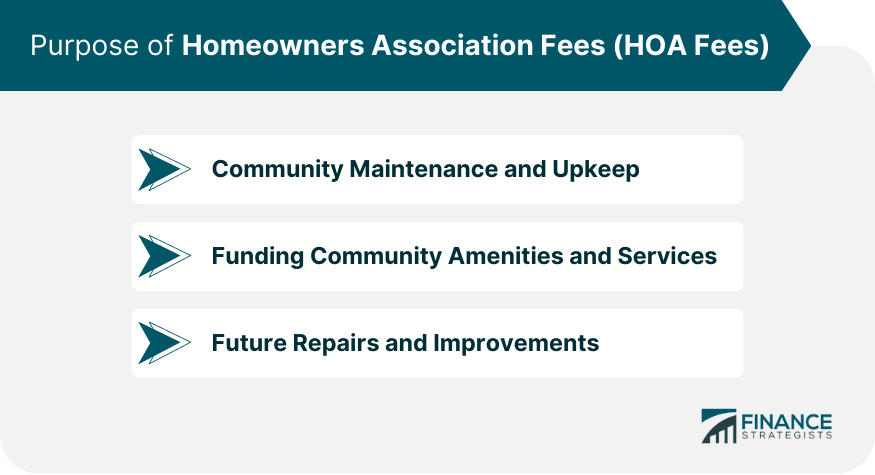
What Is the Cost?
The size of an HOA fee depends largely on the neighborhood, or complex you're living in and what services the HOA provides.
So, in short, expect a larger HOA fee, with the more available public amenities that are available.
The average monthly fee is about $200.
Basic Components of HOA Fees
Monthly Dues
These include routine maintenance costs, utility bills for common areas, and wages for HOA staff or contracted service providers.
These monthly dues are determined by the HOA's budget which is formulated considering the routine operational and maintenance costs.
Special Assessments
These are one-time costs levied by the HOA for unexpected expenses or for projects that weren't originally included in the budget.
These can include emergency repairs due to natural disasters, unforeseen structural damage, or major improvement projects that go beyond the scope of the regular budget.
These special assessments can vary greatly and homeowners are typically given notice to prepare for these additional costs.
Reserve Funds
This fund acts as a savings account for the community for future major expenses. The goal of the reserve fund is to ensure that the association is financially prepared for any significant repairs or replacements required in the future.
The amount of money required in the reserve fund can depend on the age and condition of the community facilities, the replacement costs of major items, and the current balance of the fund.
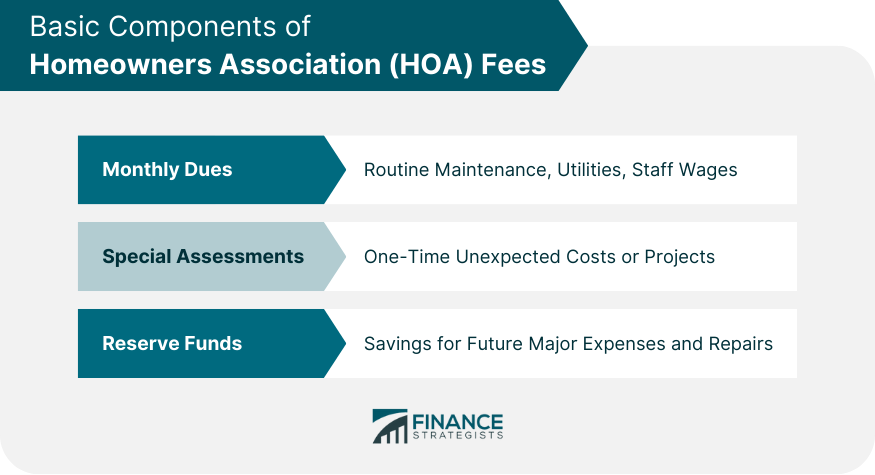
Factors Affecting HOA Fees
Location and Property Type
Properties in high-cost areas typically have higher HOA fees due to higher maintenance and operation costs. Similarly, the type of property can also influence the fees.
For example, condominiums might have higher HOA fees than single-family homes due to the additional shared facilities and common spaces that need to be maintained.
Amenities and Services
The range and quality of amenities and services offered in a community also greatly impact the HOA fees. Communities with many high-end amenities, like pools, fitness centers, and security services, will likely have higher fees.
The more services provided, such as landscaping for individual units, cable, or internet, the higher the costs that need to be covered.
Property Size and Value
In general, the larger or more valuable the property, the higher the HOA fees. This is because larger properties often require more maintenance and contribute more to the wear and tear of communal areas.
Similarly, more expensive properties may be located in communities that offer more amenities, which would also lead to higher fees.
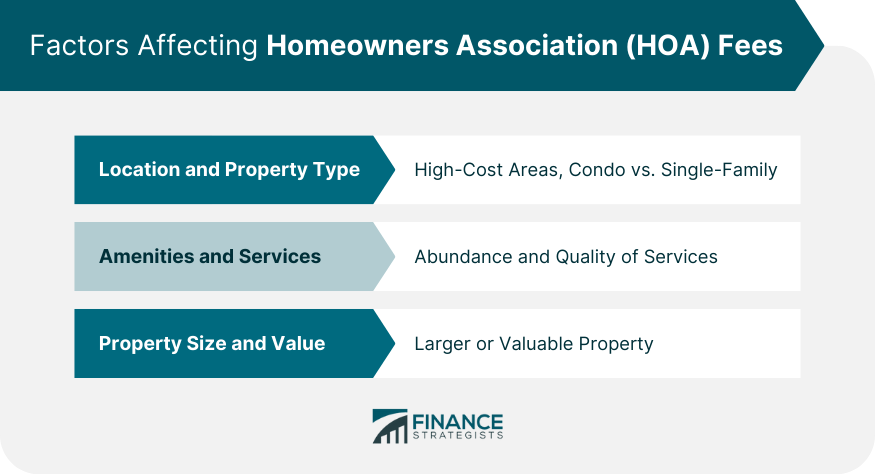
Benefits of HOA Fees
Maintenance and Repairs
This includes landscaping, general upkeep, and potentially costly structural repairs. This can save homeowners significant time, effort, and money compared to maintaining a property independently.
Community Facilities and Services
These can include recreational facilities like swimming pools, tennis courts, or gyms, as well as services like security and waste management. These amenities can greatly enhance the quality of life for residents and add convenience.
Enhanced Property Value
HOA fees also contribute to maintaining and potentially enhancing the value of individual properties within the community.
This is achieved by ensuring a consistent aesthetic appeal throughout the community, maintaining shared amenities and facilities, and upholding a standard of living through community rules and regulations.
Potential Drawbacks of HOA Fees
Lack of Control
Homeowners often have limited influence over the HOA's budget and may disagree with how their money is being spent. This could lead to frustration and disputes within the community.
Fee Increases
HOA fees can and often do increase over time due to rising operational costs, inflation, or the need for significant repairs or improvements.
These increases can strain homeowners' budgets and may not align with personal financial planning.
Financial Mismanagement
In some cases, an HOA might not manage its funds effectively or ethically, leading to insufficient reserves, unexpected special assessments, or even legal trouble. This could potentially lead to financial loss for homeowners and disputes within the community.
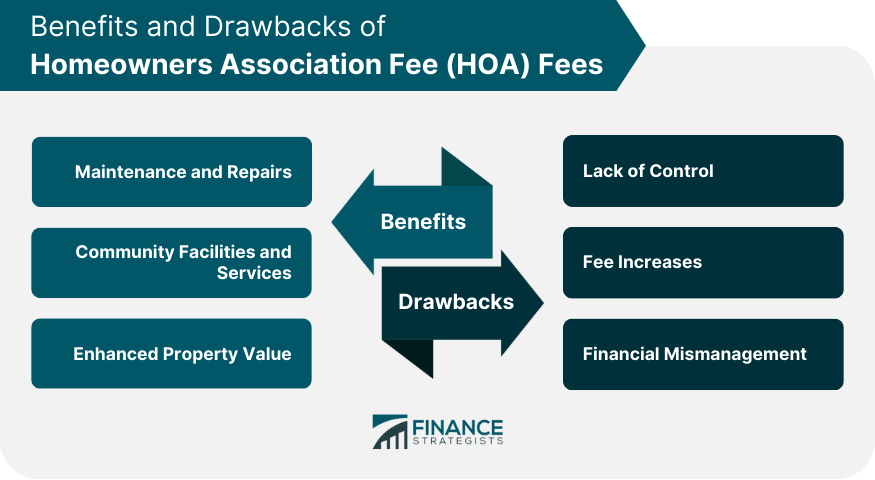
How to Evaluate HOA Fees When Buying a Property
Review HOA Documents
Before buying a property within a homeowners association, it is important to review the HOA documents.
These documents, which typically include the HOA's bylaws, CC&Rs (Covenants, Conditions & Restrictions), and financial statements, provide vital information about the HOA's operations, including how it sets and uses its fees.
Carefully reviewing these documents can give potential homeowners a clear understanding of what they're getting into.
Understand Fee History
Understanding the history of HOA fee increases is also essential. This information can give potential buyers an idea of how much the fees might increase in the future.
If fees have regularly increased significantly year over year, it might be a red flag that the HOA is not managing its funds effectively or that costly repairs or improvements are on the horizon.
Assess HOA Financial Health
Assessing the financial health of the HOA is another crucial step. Potential buyers should look at the HOA's budget, financial statements, and reserve study.
These documents can provide insight into the HOA's financial stability and its preparedness for future expenses. If the reserve fund is low or if the HOA is running a deficit, it could indicate potential financial issues down the line.
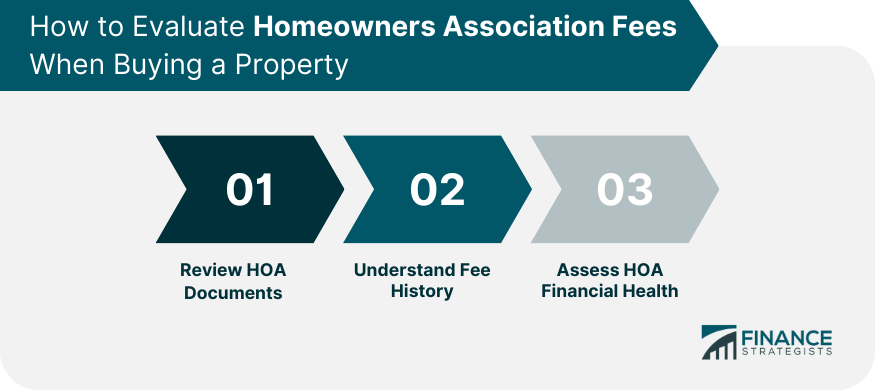
When Payment Is Deferred
If you were to decide to not pay their HOA fee, then depending on the agreement you and the HOA have made, the HOA has the right to charge late fees, or even take measures toward foreclosing on your property.
So be sure to pay those HOA fees, they're no joke!
Also, HOA fees, although a possible annoyance, really do a lot to raise the quality of life, as well as the value of your home.
Conclusion
Homeowners Association Fees (HOA Fees) are monthly payments made by homeowners to their neighborhood Homeowners Association (HOA).
These fees are imposed by the HOA, an organization formed by a community of homeowners.
The purpose of HOA fees is to maintain and enhance shared common areas, provide amenities and services, and prepare for future repairs and improvements.
These fees can save homeowners time and effort on maintenance, improve the quality of life through recreational facilities and services, and contribute to the overall property value.
Homeowners may face challenges due to a lack of control over budget decisions, the possibility of fee increases, and potential financial mismanagement by the HOA.
When evaluating HOA fees before buying a property, it is essential to review HOA documents, understand the fee history, and assess the HOA's financial health.
It is crucial for homeowners to stay informed and engaged in the decision-making processes to ensure the fees are used effectively and responsibly.
Homeowners Association Fee (HOA Fee) FAQs
Homeowners associations are organized to market, maintain, and protect and develop residential resal estate properties. Often residents are on these associations.
Homeowners Association Fees are monthly payments, made by a homeowner to their neighborhood Homeowner’s Association (HOA).
HOA fees are collected and then put to use for the purpose of maintaining or expanding shared common areas within the neighborhood or complex.
The size of an HOA fee depends largely on the neighborhood, or complex you’re living in and what services the HOA provides.
If you were to decide to not pay your HOA fee then, depending on the agreement you and the HOA have made, the HOA has the right to charge late fees, or even take measures toward foreclosing on your property.
True Tamplin is a published author, public speaker, CEO of UpDigital, and founder of Finance Strategists.
True is a Certified Educator in Personal Finance (CEPF®), author of The Handy Financial Ratios Guide, a member of the Society for Advancing Business Editing and Writing, contributes to his financial education site, Finance Strategists, and has spoken to various financial communities such as the CFA Institute, as well as university students like his Alma mater, Biola University, where he received a bachelor of science in business and data analytics.
To learn more about True, visit his personal website or view his author profiles on Amazon, Nasdaq and Forbes.











